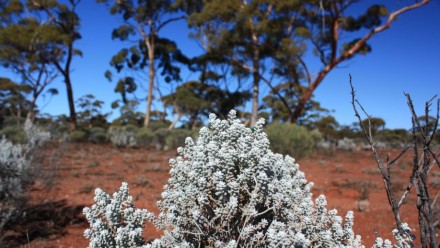Future heat waves a major threat to Australian plants
An international study led by ANU has found the hottest temperatures on record this year are bad news for Australia's plants.
But further research promises to help design food crops that will be able to handle heat stress.
Lead researcher Professor Owen Atkin said the study found native plants in inland Australia were near a tipping point in coping with the rising temperatures, which suggested that they would struggle to survive during future heat waves.
"We surveyed plant life around the globe for their high-temperature tolerance and we showed that the potential for damage is most severe for hot, inland, mid-latitude regions," said Professor Atkin from the ARC Centre of Excellence in Plant Energy Biology at ANU Research School of Biology.
"Maximum air temperatures during heat waves in Australia are among the most extreme globally."
With funding from the ARC Centre of Excellence in Plant Energy Biology and the Grains Research Development Corporation (GRDC) in Australia, researchers are using the results of the study to identify wheat varieties capable of better handling heat stress.
Professor Atkin said plants growing in the dry, inner regions of Australia were at particularly high risk.
"We could see dramatic changes to the face of Aussie plant life in the future," he said.
The study, published in the journal Global Change Biology, provides comprehensive analysis of heat tolerance in plants from habitats around the world, including 19 remote sites in the arctic, tropics and deserts.
By exposing leaves to increasing temperatures during controlled tests, the researchers were able to pinpoint the exact temperatures where leaf metabolism became damaged by heat. They found that two critical processes for plant growth and survival, namely photosynthesis and leaf respiration, were damaged by high-temperature extremes.
Lead author Dr Odhran O'Sullivan from the ANU Research School of Biology said the study suggested high temperatures during heat waves would damage a plant's ability to function, particularly in sun-exposed, upper canopy leaves.
"This means extreme heat-wave events, predicted to increase in intensity with climate change, could have devastating effects on natural plant populations and ecosystems, and the latitudes at risk will likely expand in the long term,' Dr O'Sullivan said.
Professor Atkin said the findings had important implications for farmers growing crops in hot, inland regions of Australia.
"We know that crop yields are negatively affected by heat-waves, often when crops are flowering," he said.
"Our results point towards heat damage to leaves being a further factor contributing to reduced crop yields. The potential for such damage will only increase as global temperatures rise.
"Because heat waves are becoming more extreme and frequent, there is an urgent need to improve heat tolerance of leaf metabolism in crops, such as wheat, that are often grown in hot, arid regions."
The study involved researchers from the ARC Centre of Excellence in Plant Energy Biology at ANU and Western Sydney University, and from several leading institutions in the United States, United Kingdom, Sweden and New Zealand.











